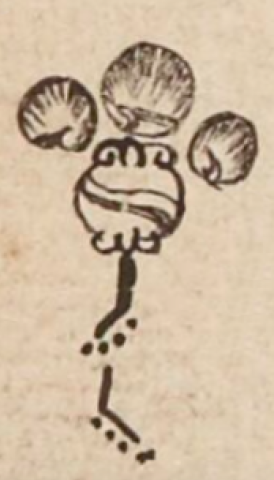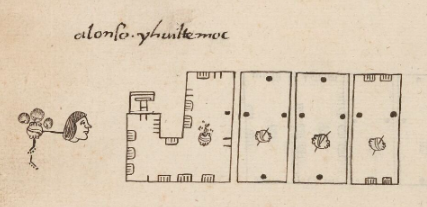Ihuitl Temoc (Verg9v)
This black-line drawing of the compound glyph for the personal name Ilhuiltemoc (“The Feather Descended,” attested here as a man’s name) shows a frontal view of three down feathers (ihuitl), below them is an upright stone (tetl}, with curling ends and wavy lines across the middle. The stone is a phonetic complement for the -te in the name. Finally, at the bottom, are two alternating footprints that bring to mind the verb temo (in the preterit, temoc).
Stephanie Wood
We have another glyph for this name from another manuscript, and it has a wing feather instead of down feathers. There was a famous don Diego Luis Moctezuma Ihuitl Temoc (also spelled Ihuitemotzin). Perhaps this Alonso is named for don Diego or another illustrious person who shared this name.
Footprint glyphs have a wide range of translations. In this collection, so far, we can attest to yauh, xo, pano, -pan, paina, temo, nemi, quetza, otli, iyaquic hualiloti, huallauh, tetepotztoca, totoco, -tihui, and the vowel "o." Other research (Herrera et al, 2005, 64) points to additional terms, including: choloa, tlaloa, totoyoa, eco, aci, quiza, maxalihui, centlacxitl, and xocpalli.
Stephanie Wood
alonso.yhuiltemoc
Alonso Ihuitl Temoc
Stephanie Wood
1539
Jeff Haskett-Wood
stones, piedras, plumas, feathers, huellas, icximachiyotl, xocpalli, icxipamitl, ihuitl, temoc

ihui(tl), feathers, https://nahuatl.wired-humanities.org/content/ihuitl
temo, to descend, https://nahuatl.wired-humanities.org/content/temo
Codex Vergara, folio 9v, https://gallica.bnf.fr/ark:/12148/btv1b84528032/f26.item.zoom
The non-commercial reuse of images from the Bibliothèque nationale de France is free as long as the user is in compliance with the legislation in force and provides the citation: “Source gallica.bnf.fr / Bibliothèque nationale de France” or “Source gallica.bnf.fr / BnF.” We would also appreciate a citation to the Visual Lexicon of Aztec Hieroglyphs, https://aztecglyphs.wired-humanities.org/.









